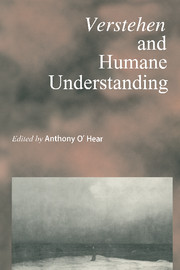Book contents
- Frontmatter
- Contents
- Notes on Contributors
- Preface
- ‘Two Cultures’ Revisited
- Rational and Other Animals
- Vico and Metaphysical Hermeneutics
- Three Major Originators of the Concept of Verstehen: Vico, Herder, and Schleiermacher
- Weber's Ideal Types as Models in the Social Sciences
- Verstehen, Holism and Facism
- Interpretation in History: Collingwood and Historical Understanding
- The Meaning of the Hermeneutic Tradition in Contemporary Philosophy
- Science and Psychology
- To Mental Illness via a Rhyme for the Eye
- Can There be an Epistemology of Moods?
- Feeling and Cognition
- Believing in order to Understand
- Data and Theory in Aesthetics: Philosophical Understanding and Misunderstanding
- Anti-Meaning as Ideology: The Case of Deconstruction
- Perictione in Colophon
- Index of Names
Feeling and Cognition
Published online by Cambridge University Press: 17 May 2010
- Frontmatter
- Contents
- Notes on Contributors
- Preface
- ‘Two Cultures’ Revisited
- Rational and Other Animals
- Vico and Metaphysical Hermeneutics
- Three Major Originators of the Concept of Verstehen: Vico, Herder, and Schleiermacher
- Weber's Ideal Types as Models in the Social Sciences
- Verstehen, Holism and Facism
- Interpretation in History: Collingwood and Historical Understanding
- The Meaning of the Hermeneutic Tradition in Contemporary Philosophy
- Science and Psychology
- To Mental Illness via a Rhyme for the Eye
- Can There be an Epistemology of Moods?
- Feeling and Cognition
- Believing in order to Understand
- Data and Theory in Aesthetics: Philosophical Understanding and Misunderstanding
- Anti-Meaning as Ideology: The Case of Deconstruction
- Perictione in Colophon
- Index of Names
Summary
There is a common view that as well as being conscious of the world in virtue of having thoughts about it, forming representations of its various states and processes, we are also conscious of it in virtue of feeling it. What I have in mind is not the fact that we have feelings about the world—indignation at this, pleasure at that—but that we sensorily feel its colours, sounds, textures and so on. And this feeling form of consciousness, it's often thought, constitutes a peculiarly intimate and intense focus upon things. The feel of the first drops of rain on one's face and the sounds of the gull's cry will quickly be recognized for what they are; and the fact that events of this sort are occurring will thereafter hold one's attention just insofar as they are relevant to some current business. But what can also happen is that such experiences cut through any current concerns and cause a state in which, for a time, one does nothing except feel the soft coolness of the rain and the particular quality of the bird's cry. We can become absorbed, it seems, in the mere presence of these phenomena and this is an experience to which we attach great value.
But common as these thoughts are, they would be regarded by most contemporary philosophers as exhibiting serious confusions about the nature of sensing, knowledge and consciousness.
- Type
- Chapter
- Information
- Verstehen and Humane Understanding , pp. 211 - 222Publisher: Cambridge University PressPrint publication year: 1997



